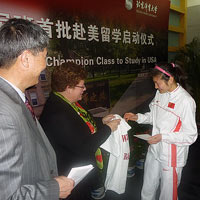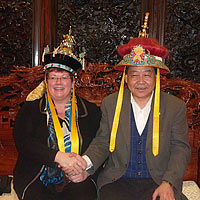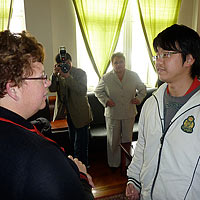Martin returns from successful China trip
Chancellor Biddy Martin recently returned from a 13-day trip to China and expressed optimism that the university’s presence and visibility in the world’s most populous nation is growing.
The trip included stops in Beijing, Tianjin, Hangzhou and Shanghai, and the UW-Madison delegation met with Chinese education officials, numerous universities, UW-Madison parents and alumni.
Martin provided thoughts about the trip upon her return to Madison on April 4, 2010. A full transcript follows.
Could you describe your feelings about the trip?

Chancellor Martin meets with Xing Huina, 2008 gold medalist and future UW student, at Beijing Sport University on March 27.
A. Among other things, I return with a heightened sense of urgency about our responsibility to engage with China. It was a wonderful experience, for many reasons: because of the extraordinary pace of change and development in China and the consequent and sometimes jarring juxtaposition of the ancient with the new; because of a palpable sense of futurity and hope in China; because of the extraordinary level of respect and courtesy with which we were treated. The Chinese People’s Friendship Association President, Li Xiaoling, hosted a lovely dinner for us shortly after our arrival. The entire group was received by a vice minister of education responsible for policy, and I was invited to a very enjoyable and informative lunch meeting with (a different) vice minister for education who has responsibility for international affairs.
I was moved by the sense of urgency among the students, parents, alumni, business leaders and university presidents we met, many of whom who spoke explicitly about the importance of seizing what they see as unprecedented opportunities. The trip was made memorable because of the aesthetic beauty to which we were exposed--natural and human-made; it was stimulating because of the far-reaching policy discussions about higher education and the awareness of those discussions among students and the public more generally. Those discussions made “the Wisconsin Idea” particularly interesting to our audiences.
The trip was moving because of the striking friendliness and helpfulness of the Chinese people with whom we interacted. It was an important trip because of what we learned, but also because of the contacts we made and the relationships we built or strengthened with our alumni, with the parents of our current students, with prospective students, with the leaders of a significant number of top universities, with business and government officials.
It is gratifying to see firsthand what a strong reputation UW-Madison enjoys in China. Recall that Irv Shain was one of the first university presidents to visit China after it opened up in the late seventies. He had the foresight to see China’s importance long before other university leaders became aware of it. I was given a photograph of his meeting with the then president of Zhejiang University when I was in Tianjin. His efforts are appreciated to this day. The Shanghai Jiao Tong University rankings of the world's best universities enhance UW-Madison's already strong reputation in China (and in the rest of the world). However, it is also apparent that we need to strengthen our efforts to build consistent and substantive relationships with our friends and partners there. The economic, social and cultural changes in China and in China's relationships with the rest of the world make it imperative that all of us learn more about China, spend time there and engage with the Chinese people. It is an exciting place to be and an important place to understand. I felt particularly aware of the importance of youth and education. The future of U.S.-China relations depends on the relationships that young people build with one another and the quality of their collaborative efforts to solve the genuinely daunting problems of economic and environmental sustainability and peace.
Do you feel that you accomplished what you had hoped to do?

Chancellor Martin and Rao Zihe, president and "king" of Nankai University and a distinguished Chinese scientist. Zihe hosted an elegant banquet for the delegation.
A. Yes, we accomplished far more than I had anticipated. In addition to the friendly and fruitful meetings we had with our counterparts, with government officials and with business leaders, we were also fortunate to have excellent media coverage of the various events and meetings. I believe the visibility of UW-Madison and of the state of Wisconsin itself were enhanced by our visit. The incredibly strong reputation of UW-Madison could be better leveraged by the state and I would like to see more joint efforts to take advantage of the visibility of one of Wisconsin's greatest assets--its world-class research university and its international reputation.
I think the visit helped open up the possibility for more faculty and student exchanges and collaborations and more institution-to-institution partnerships. The alumni and parents' events helped generated excitement and interest in the alumni chapters and in the UW!
Is there any facet of the trip that you feel was especially successful?
A. The Wisconsin ginseng that we brought to give as gifts! I am very pleased about the relationships we are building with university leaders, alumni and business people in China. I found the meetings in Beijing with the China Investment Promotion Agency (CIPA) very promising. The official invitational ceremony for the Chinese Olympic athletes, who are coming to the UW to study for six months, was one of the most memorable parts of our trip. The athletes are national treasures in China and there was a great deal of interest in their upcoming trip and six-month stay at UW-Madison. The meetings for the parents of our current or recently admitted students were especially moving. Parents traveled for hours at significant expense to attend, because their children asked them to and because of their concerns about their children. Many, if not most, have never been to the United States or visited Madison. Their questions gave us a clear sense of what they value, what concerns them, and how we can be more helpful to them and to our students. The meetings also revealed the similarities between Chinese and U.S. parents, in their aspirations for their children's education, their sense of urgency about higher education and their worries about their children's prospects.
Is there an institution or institutions that you felt a special connection with? Or that might be ready to collaborate quickly?
A. We have the beginnings of substantive and sustainable collaborations with some top universities, including Tsinghua, Nankai, Beijing Normal, Shanghai Jiao Tong University and others. In fact, existing collaborations with the universities we visited were the key to our successful trip. I am optimistic about building stronger connections with those universities and with Beijing University, East China Normal and Zhejiang. Beijing University of Sport, which is the home campus for the athletes who will study in Madison next semester, will almost certainly become a partner. In general, UW-Madison should take greater advantage of the university's reputation in China.
In your view, what kinds of differences did you see among the four cities that you visited?

Chancellor Martin meets with a student from Wei Yu high school who has been accepted to UW-Madison, but has not yet decided to enroll.
A. Because this was my second visit to Beijing and Shanghai, I was delighted that we added Tianjin and Hangzhou to our travel plans. They are both beautiful cities with fascinating histories. Tianjin is developing at lightning speed, because of its proximity to Beijing, its thriving industries, including biotech industries, and its lower cost of living. The high-speed rail trip from Beijing to Tianjin, which took a mere 28 minutes at over 340 kph, was one of the most telling experiences we had.
China's focus on building infrastructure to support economic and social development was evident in every city we visited, as was the government's heavy investment in higher education.
Hangzhou, which is close to Shanghai, was in bloom when we arrived after several chilly days in Beijing and Tianjin. The combination on West Lake of the very green weeping willows and the red and pink flowering fruit trees was incredibly beautiful. Because West Lake is so still, the reflections of the willows, the flowers, the boats and temples in the water created stunning views and vivid memories.
Shanghai is preparing for the opening in May of the World Expo, and the preparations were visible everywhere we went. The Bund has been renovated, as have other parts of this bustling, thoroughly international city. I regret that we missed seeing the Expo. Some of the exhibits sound mind-boggling.
What are your impressions of the Chinese people that you met?
A. The Chinese people we met could not have been friendlier or more helpful. Their graciousness and generosity were often stunning. I was fascinated by people's individual stories, especially some of the members of my generation and older who lived through the cultural revolution and who are now experiencing forms of development and change that they could not possibly have foreseen. I was taken by people's sense of urgency about taking advantage of the opportunities that have emerged and their sense of pride. I was also struck by their concern about strains in the relationship between the U.S. and China and their desire to have us understand what's going on in China for the Chinese people.
China is a complicated country. Could you describe the logistics that went into the trip?
A. Kim Santiago, our Asia coordinator, did a masterful job of organizing the trip and the day-to-day logistics. Kim is a former Olympic athlete, and that's what it took to get us through the schedule we designed for ourselves! Paula Bonner traveled on behalf of the Alumni Association and did her usual splendid job of making people feel appreciated and included in the Badger family! At every turn we had the wonderful John Lucas to set up our communications efforts. He was aided in China by the work of Liya Rong.
We had the great advantage of having extraordinarily knowledgeable faculty members on the trip or parts of the trip, faculty who are responsible for existing collaborations in China. Professor Ed Friedman is a political scientist who has been studying China for decades. Ed accompanied Irv Shain on his 1979 visit to China and his deep knowledge, his extraordinary storytelling ability, his knowledge of Chinese history and politics, his mastery of Chinese, and his sense of humor count for the rest of us among our most memorable experiences. Sangtae Kim, director of the Morgridge Institute for Research, helped us inform our hosts of the UW’s strengths in biotechnology and technology transfer, and introduced them to investment opportunities. Professor Li Li Ji, Department of Kinesiology in the School of Education, grew up in Shanghai and was a wonderful and generous companion and guide. He is responsible for working out the arrangements for the Olympic athletes. The high regard in which he is held by his friends and associates at Beijing University of Sport was immediately apparent. He also helped with arrangements at East China Normal University, his alma mater, and set up a visit for us at his former high school in Shanghai, where he, John Lucas and I played basketball with the students! I have paid for that experience!
A-Xing Zhu, a member of our great geography department, has initiated a very promising collaboration with geographers at Beijing Normal University and helped arrange for our visit there. Gilles Bousquet, dean of International Studies, was involved at every step in the design of the trip and served as our point of contact with his counterparts in international relations at every university we visited. His extensive international experience helped us tremendously, as did his grace. Professor John Ohnesorge, School of Law, has been visiting and working with scholars in China for a long time and leads a collaborative effort with law faculty at Shanghai Jiao Tong University. His insights, experience and knowledge of Chinese were invaluable. Professor Shi Jin, chair of our Department of Mathematics, has established a collaborative relationship with mathematicians at Jiao Tong and joined us in Shanghai for a very enjoyable exchange with Jiao Tong University president Zhang. Wei Rong, professor of design in the College of Human Ecology, joined us in Beijing, and Hongming Zhang, professor of linguistics, helped his collaborators and friends at Nankai welcome, orient and host us. His enthusiasm and his lessons in pronunciation of Chinese names and greetings energized us when our energy was flagging a bit! It was wonderful to have an opportunity to spend time with our faculty, and they could not have been more generous with their time and energy. They attended and helped field questions at the meetings with parents. They met former students and friends at the alumni receptions and dinners. They attended the lectures I was asked to give and provided support of every conceivable kind. They are the embodiment of the Wisconsin Idea, each one of them.
What kind of follow-up will take place about China?
A. We have a range of commitments on which we want to act immediately, including the possibility of establishing parents' organizations in Beijing and Shanghai. But our primary focus will be on the future and how to be strategic about our presence in China and our exchanges and collaborations with specific institutions. We want to support faculty and student engagement in China and strengthen institution-to-institution ties. We'd also like to work with the governor's office and the Commerce Department, share our experiences and explore how UW-Madison could be helpful in creating opportunities for attracting investment to the state.
Selected Chinese-language media coverage of Chancellor Martin’s Trip:
To be a Chancellor for Students — — an Interview to Chancellor Biddy Martin of University of Wisconsin-Madison
Xinhua News Agency Reference News, Beijing
Biddy Martin to Choose China as First Stop for her Asian Visit
Economic Daily
Eleven Chinese Champions to Study at the University of Wisconsin
Science & Technology Daily
University of Wisconsin-Madison Held the Parents Meeting in China
Beijing Education News
China's Champion go into the University of Wisconsin
Beijing Evening Post
China Education News: China Vice Minister of Education Department Chen Xi Met Chancellor Martin of the University of Wisconsin-Madison
China Ministry of Education (Press Release)


